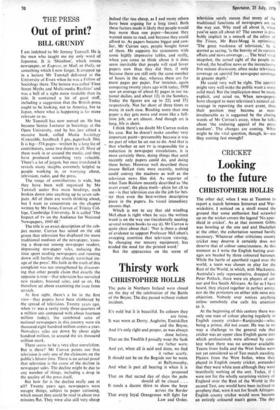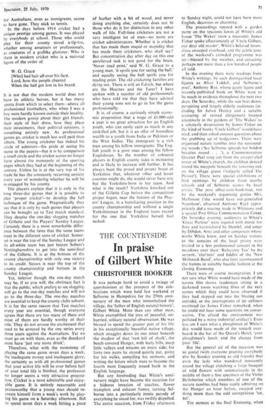CRICKET
Looking to the future
CHRISTOPHER HOLLIS
The other da37, when I was at Taunton to report a match between Somerset and War- wickshire, I noticed on a stroll round the ground that some enthusiast had scrawled up on the wicket-covers the legend 'No apar- theid in cricket'. As at that moment Gibbs was bowling at the one end and Ibadullah at the other, the exhortation seemed hardly necessary. Whatever other criticisms county cricket may deserve it certainly does not deserve that of colour consciousness. At this moment as I write the English batting aver- ages are headed by three coloured batsmen. While the battle of apartheid raged over the world, a team was chosen to play for the Rest of the World, in which, with Mackenzie, Australia's only representative, dropped for Peter Pollock, there were six players of col- our and five South Africans. As far as I have heard, they played together in perfect amity; nor do the protesters on either side raise any objection. Nobody ever notices anything unless- somebody else calls his attention to it.
At the beginning of this century there was only one man of colour playing regularly in English county cricket—Ran jitsinjhi—who, being a prince, did not count. He was in no way a challenge to the general rule that cricket was an upper class English game into which professionals were allowed by cour- tesy when there was no amateur available. Teams from India and the West Indies were not yet considered as of Test match standing. Players from the West Indies, when they played in English county cricket, pretended that they were white men although they were manifestly nothing of the sort. Today, if it were not for the wholly surprising victory of England over the Rest of the World in the second Test, one would have been inclined to prophesy that, were it not for South Africans, English county cricket would soon become an entirely coloured man's game. The day
for Australians. even as immigrants, seems to have gone. They stick to tennis.
In the days before 1914 cricket had a unique prestige among games. It was played by everybody at school. Those who could play for their county stood a-tip-toe, whether among amateurs or professionals, as creatures of a godlike glamour. Who is there in modern cricket who is a national figure of the order of W. G. Grace [Who] had hair all over his face. Lord, how the people cheered When the ball got lost in his beard.
It is not that the modern world does not have its athletic heroes, but it has many sports from which to select them—above all professional footballers, who when I was a boy were hardly known outside their locality. The modern gossip about their girl friends, their style of hair dress, how they place their investments, their political opinions, is something entirely new. As professional games go, cricket is much less well paid than others. The young cricketer has indeed his circle of admirers—his pride at seeing his name in the papers—but it is by comparison a small circle and the cricket scores no longer have almost the monopoly of the sporting pages which they had at the beginning of the century. Unless he is at the very top of his trade he has the constantly recurring anxiety every year of wondering whether he will be re-engaged by his county.
The players explain that it is only in the long three-day games that it is possible to play 'proper cricket'—to develop the full technique of the game. Pragmatically they say that it is only by such games that players can be brought up to Test match standard. They despise the one-day slogging matches of Gillette and the Players' Sunday League. Certainly there is a most remarkable differ- ence between the fates that the same teams meet in the different sorts of cricket. Somer- set is near the top of the Sunday League and its all-white team has just beaten Sobers's Nottinghamshire to get into the semi-final of the Gillette. It is at the bottom of the county championship with only one victory to its credit. Sussex is near the top of the county championship and bottom in the Sunday League.
Yet, inferior though the one-day match may be, if so you will, the obstinate fact is that the public, which prefers to see slogging, will go to the one-day matches and will not go to the three-day. The one-day matches are essential to keep the county clubs solvent. It is for the same reason that Test matches every year are essential, though everyone agrees that there are too many of them and most of them are hardly worthy of their title. They do not arouse the excitement that used to be aroused by the one series every three years against the Australians. Yet we must go on with them, even as the drunkard must have 'just one more drink'.
Therefore, what with the monotony of playing the same game seven days a week, the inadequate money and inadequate glory, the certainty as with all professional games that your active life will be over before half of your total life is finished, the profession no longer seems a very attractive proposi- tion. Cricket is a most admirable and enjoy- able game. It is entirely reasonable and praiseworthy that a young man should re- create himself from a week's work by play- ing his game on a Saturday afternoon. But to spend seven days a week hitting a piece
of leather with a bit of wood, and never doing anything else, certainly does not fit those who do it for distinction in any other walk of life. Full-time cricketers are not a very intelligent lot of men—no more are cricket administrators. Whether it is cricket that has made them stupid or stupidity that has made them cricketers, who shall say? But concentration day after day on this one unrelieved task is not good for the brain. 'Never read print,' said W. G. Grace to a young man, 'it spoils you for seeing the ball,' and equally seeing the ball spoils you for reading print. The old cricketing families are dying out. There is still an Edrich, but where are the Hearnes and the Tates? I have spoken with a number of old professionals who have told me that they have advised their young sons not to go in for the game professionally.
It is. of course, a curiously simple econo- mic proposition that a wage of f1,000-odd a year is no great attraction for an English youth, who can easily earn as much in any unskilled job, but it is an offer of boundless wealth to a youth from India or Pakistan or the West Indies. The immigrant is a rich man among his fellow immigrants. The Eng- lish youth is a poor man among his fellow Englishmen. So the number of coloured players in English county sides is increasing and is likely to increase still further. It has always been the proud and proper boast of Yorkshire that, whatever other and lesser counties might do, she would never have any but the Yorkshire-born in her team. And what is the result? Yorkshire knocked out of the Gillette Cup before the competition proper began, near the bottom of the Play- ers' League, in a humiliating position in the county championship and without a single Yorkshireman in the England team except for the one that Yorkshire herself had sacked.































 Previous page
Previous page